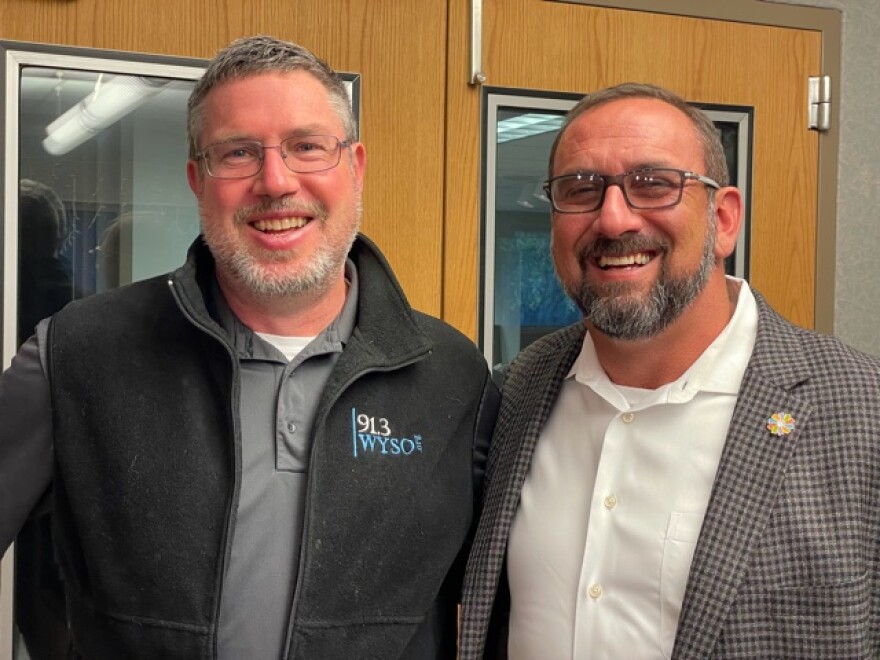Air Force veteran Ben Goodstein is a vice president at Dayton Children's Hospital. The military taught him how to be a leader. Today, he draws from his training and mentors other veterans. He reminds them that their time in the service set them up for success. He told his story to Dr. Seth Gordon, of the Wright State Veteran and Military Center.
"In the military, if you stay in for more than four years, they really push you into leadership. So, they were teaching the military leadership and I loved it because it's black and white: do as I say, because I said to do it and get it done. That's wildly successful if people respect you. If they don't respect you, it's a whole new ballgame. So, I fell in love with the relationship part of leadership more than the dictatorship of leadership and started figuring out relationships about leadership are not just for the people below you, but they’re for the people above you. The more you build relationships above you, the more opportunities you'll have in your career. Everybody calls it politics. It's actually not politics. It's pure relationship management. If you're fake about it, people know you're fake. So, I was able to figure out these personal relationships and enjoyed building them, and I’m still connected to most of those leaders today. So, I got out and kind of struggled to get my feet underneath me because now I no longer have that structure and the civilian world was pretty scary. Then one day I got an email from a recruitment firm that Dayton Children's was hiring, and would I be interested? They had heard about me."
"So, I want to be a mentor to anyone that's a veteran that's looking to figure out how to be a successful leader. That doesn't mean that you have to be a Fortune 500 CEO. It doesn't matter if you're an admin assistant, or a pastry chef in the military, it doesn't matter. You know the structure. You got to put it into action. Being a leader doesn't mean you have to be a college educated person. You can be a leader in the career field you're in, whether it's, you know, personal fitness, opening your own gym. That's leadership! That's still relationship management with your consumers. The leader can be a direct leader, a manager, a supervisor, a director, those kinds of things. Or an indirect leader, which is a mentor to the peers that they work with. So, I think that that's really important for people to understand. Being a leader doesn't have to be a title. It has to be a persona and a way of life."
"So, for me personally, right now, I’ve got 14 people that I'm mentoring. Six of them are civilians and the rest of them are all military. I don't particularly partner with any specific veteran group, but I do partner with veterans. So, I know a lot of people that are veterans that were struggling to figure out where they fit in the world. You're never going to get back the brotherhood, the sisterhood that you had in the military. It is impossible in the civilian world to find that level of loyalty. Because in the military, you depend on your battle buddy, your partners for success. If they're not successful and you're not successful, the repercussions can be really, really bad. So, you'll never find out again. What you have to find is mentors. The eight people that I’m mentoring military wise, it's creating a plan for them and making sure that I hold them accountable to the plan. But also give them the tools and resources to get them to where they need to be."
"Coming out of the military and going into the civilian world, your friends are different, your work is different, the mission is different. How do you cope with that? How do you get past the stress of the unknown and being afraid of not being able to provide for your family the way that the military you knew you're going to get a paycheck? So, for me, it's really about providing some structure and giving them guidance. My advice is to create your own structure. Stop expecting everyone else to put in line what you know you need to be successful. You know exactly what you should do. You were taught it. You were trained it. You’re a skilled operator. You know what community interactions you need to be a contributing member of the community. You know what you needed in order to get a ten on your evaluation in the military. It's the same thing in the civilian world. Now you have to do the work, you have to go out and get it."
Veterans Voices is produced at the Eichelberger Center for Community Voices by Will Davis and Tony Holloway, with support from Seth Gordon Ph.D. at the Wright State Veteran and Military Center. Financial support comes from Wright-Patt Credit Union.





